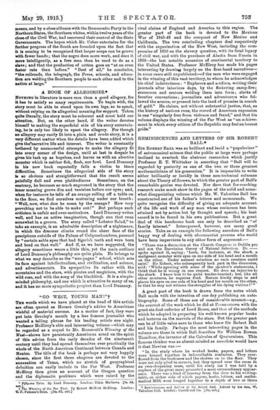"GO WEST, YOUNG MAN !"f TILE words which we have
placed at the bead of this article are often quoted as Horace Greeley's advice to Americans wishful of material success. As a matter of fact, they were put into Greeley's month by a less famous journalist who wanted a telling phrase for his leading article one night. Professor McElroy's able and interesting volume—which may be regarded as a sequel to Mr. Roosevelt's Winning of the West—ahows how persistently Americans acted on the spirit of this advice from the early decades of the nineteenth century until they had spread themselves over practically the whole of the North American Continent between Canada and Mexico. The title of the book is perhaps not very happily chosen, since the first three chapters are devoted to the annexation of Texas, which no stretch of geographical definition can easily include in the Far West. Professor McElroy then gives an account of the Oregon question and the diplomatic problems which were raised by the
• FiltbKow Tates. By Lard Donsany. London: Elkin Mathews. Pa. 6d. w ed.]
t The Winning of the Far West. By Robert McNutt McElroy. London: 11.1., Putnam's Sons, LION, ad, net.]
rival claims of England and America to this region. The greater part of the book is devoted to the Mexican War of 1845-48 and the conquest of New Mexico and California. The two concluding chapters deal respectively with the organization of the New West, including the com- promise of 1850 on the slavery question, with its fetal legacy of civil war, and with the purchase of Alaska from Russia in 1868—the last notable accession of continental territory to the United States. Professor McElroy has made his pages interesting by drawing largely on the first-band narratives— in some cases still unpublished—of the men who were engaged in the winning of this vast territory, to whom he acknowledges his chief indebtedness : "Explorers and soldiers, writing their journals after laborious days, by the flickering camp-fire; statesmen and orators welding them into form; clerks of frontier conventions; journalists and adventurers who fol- lowed the armies, or preened into the land of promise in search of gold." He claims, not without substantial justice, that, as the history of nations runs, the record of American expansion is one "singularly free from violence and fraud," and that his volume displays the winning of the Far West as " en achieve- ment in which every citizen of the Republic may feel an honest pride."


































 Previous page
Previous page